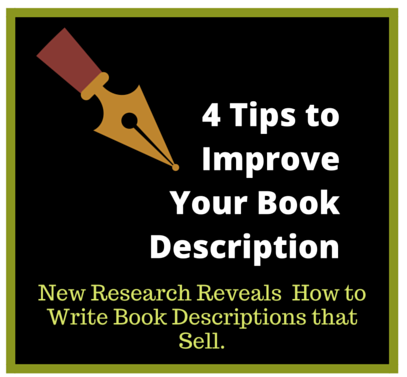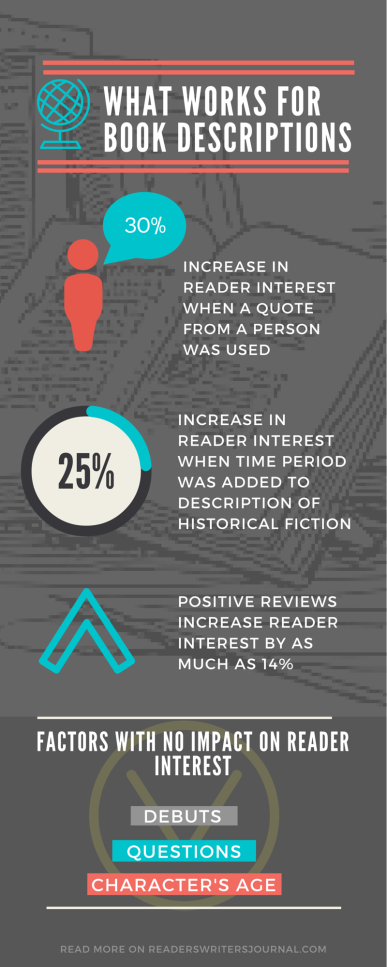 Study Reveals the Elements of Book Descriptions that Sell More Books
Study Reveals the Elements of Book Descriptions that Sell More Books
Discount eBook newsletter giant Book Bub recently conducted A/B testing for several elements of book descriptions, with the intent of finding out which words sell more books. The testing was conducted by sending two different descriptions of the same book to their newsletter subscribers, and then seeing which description received the most clicks from potential readers. Clicks, in this case, mean interest in a particular book.
The results are revealing – and useful for book descriptions, press releases, blurbs and even book trailers and social media posts about your book. The variables that caused the biggest change in click rates among potential readers who receive the discounted books newsletter are highlighted below.
Book Description Factors That Matter
![]() 1. Blurbs Should Quote People, not Publications. Those short quotes on the front of your book (“The Best Beach Read of 2015!”) should be from a person, not a publication. Book Bub’s research showed that when the quote came from another author, the book received a 30.4 percent higher click rate.
1. Blurbs Should Quote People, not Publications. Those short quotes on the front of your book (“The Best Beach Read of 2015!”) should be from a person, not a publication. Book Bub’s research showed that when the quote came from another author, the book received a 30.4 percent higher click rate.
 2. Put Your Reader in the Picture. If you can help a potential reader see herself in your book description, you’re more likely to make the sale. “If you love military thrillers, don’t miss this gripping new read” will sell more than “Gripping new read” alone. Put another way, reach out to romance lovers, historical fiction lovers, cozy mystery lovers, etc. and tell them that your book is for them. Book Bub’s research showed that these small additions increased click rates by as much as 20%.In the case of historical fiction, simply adding the time period in which the book takes place to the book description increased clicks by 25.1%!
2. Put Your Reader in the Picture. If you can help a potential reader see herself in your book description, you’re more likely to make the sale. “If you love military thrillers, don’t miss this gripping new read” will sell more than “Gripping new read” alone. Put another way, reach out to romance lovers, historical fiction lovers, cozy mystery lovers, etc. and tell them that your book is for them. Book Bub’s research showed that these small additions increased click rates by as much as 20%.In the case of historical fiction, simply adding the time period in which the book takes place to the book description increased clicks by 25.1%!
 3. Reviews Matter. Books that had at least 150 five star reviews on Amazon or Goodreads were more 14.1% more likely to be chosen by potential readers who receive Book Bub’s newsletter. Having positive reviewes on Goodreads seemed to have a greater impact than the same number of positive reviews on Amazon, but whichever number is higher for you should be the one that you play up in your description or press release or sales copy. The more positive reviews your book has on either site, the better the sales.
3. Reviews Matter. Books that had at least 150 five star reviews on Amazon or Goodreads were more 14.1% more likely to be chosen by potential readers who receive Book Bub’s newsletter. Having positive reviewes on Goodreads seemed to have a greater impact than the same number of positive reviews on Amazon, but whichever number is higher for you should be the one that you play up in your description or press release or sales copy. The more positive reviews your book has on either site, the better the sales.
 4. Award-Winners Win. If your book has won an award, mention it. No matter how small or how obscure, award-winning books had a 6.7 % higher click rate. This was especially true for awards that were genre-specific.
4. Award-Winners Win. If your book has won an award, mention it. No matter how small or how obscure, award-winning books had a 6.7 % higher click rate. This was especially true for awards that were genre-specific.
Book Description Factors That Don’t Matter
The results of the A/B testing for book descriptions was just as interesting for the variables that didn’t seem to matter. Among the variables tested that had little or no effect on the click rates of potential readers were:
Bestseller Type. Being able to honestly say that your book is a bestseller matters, but where it’s a bestseller does not seem to have an impact on sales. New York Times, USA Today and Amazon bestsellers all did equally well. This is a boon to self-published authors who mostly sell online: Amazon calculates bestseller status much more frequently than any other site, and only takes its own sales into account. That means that many more books are likely to achieve bestseller status.
Questions vs Statements. Book descriptions with opening lines (or “hooks”) that posed questions did no better than those with hooks that made statements. For instance “Will Leila find out that he’s the perfect guy?” and “Leila may find out that he’s the perfect guy.” will yield the same number of clicks.
Age is Just a Number. Mentioning the main character’s age had no impact on reader interest, even in the Young Adult genre.
New Author vs. Seasoned Professional. When a book was an author’s debut, mentioning that fact had no impact on the amount of reader interest/clicks the book received.
To learn more about the study, visit BookBub’s uPublishU site.
For more FREE Book Marketing ideas, resources and how-to guides on publicity and book promotion, see our page devoted to Book Marketing Resources for Self-Published Authors.
 E.T. Carlton is a book marketing and digital branding consultant who writes on a variety of book marketing topics, including tips on writing book descriptions.
E.T. Carlton is a book marketing and digital branding consultant who writes on a variety of book marketing topics, including tips on writing book descriptions.




Reblogged this on Chris The Story Reading Ape's Blog.
LikeLiked by 1 person
Reblogged this on The intangible world of the literary mind.
LikeLike
Thanks for sharing this good information. 🙂
LikeLiked by 1 person
You’re more than welcome! Hope the data helps refine your book description.
LikeLike
Pingback: Cover Me: The Best Self-Published Book Covers | readers+writers journal
Reblogged this on Memoir Notes.
LikeLike
Quite revealing this A/B split testing. Who knew quotes coming from actual people instead of a magazine could get so many more clicks? I certainly didn’t and I was probably losing 30% of clicks because of this. I always try to create a powerful book description, mentioning the era and type of book it is (military, 1948, etc). Also knew about reviews, I mean who doesn’t read them nowadays but didn’t know about that 150 number. Who did they come up with this particular number?
LikeLiked by 1 person